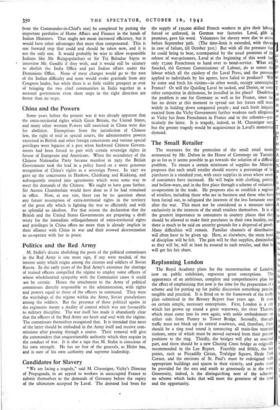China and the Powers
Some years before the present war it was already apparent that the extra-territorial rights which Great Britain, the United States, and many other western Pc.wers still exercised in China were due for abolition. Exemptions from the jurisdiction of Chinese law, the right of trial in special courts, the administrative powers exercised in British and other foreign concessions and various special privileges were legacies of a past when backward Chinese Govern- ments had been forced to part with certain sovereign rights in favour 'of Europeans and Americans. When the ascendancy of the Chinese Nationalist Party became manifest in 1925 the British Government took the lead in a policy based on a more generous recognition of China's rights as a sovereign Power. In 1927 we gave up the concessions in Hankow, Chinkiang and Kiukiang, and subsequently entered into agreements which went some way to meet the demands of the Chinese. We ought to have gone farther. Sir Austen Chamberlain would have done so if he had remained in office. Now, at any rate, there can be no question about any future resumption of extra-territorial rights in the territory of the great ally which is fighting the war so efficiently and with so splendid an idealism. For that reason the declaration that the British and the United States Governments are preparing a draft treaty for the immediate relinquishment of extra-territorial rights and privileges in China offers no more than is already implicit in their alliance with China in war and their avowed determination to co-operate with her in peace.


























 Previous page
Previous page